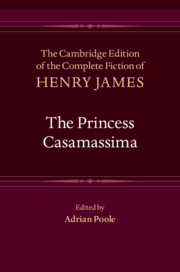Book contents
- Frontmatter
- Contents
- List of Illustrations
- Acknowledgements
- List of Abbreviations
- General Editors’ Preface
- General Chronology of James’s Life and Writings
- Introduction
- Textual Introduction
- Chronology of Composition and Production
- Bibliography
- The Princess Casamassima
- Glossary of Foreign Words and Phrases
- Notes
- Textual Variants I: Substantive Variants up to Copy Text
- Textual Variants II: Substantive Variants after Copy Text
- Emendations
- Appendix: Preface to New York Edition
XX
Published online by Cambridge University Press: 11 April 2021
- Frontmatter
- Contents
- List of Illustrations
- Acknowledgements
- List of Abbreviations
- General Editors’ Preface
- General Chronology of James’s Life and Writings
- Introduction
- Textual Introduction
- Chronology of Composition and Production
- Bibliography
- The Princess Casamassima
- Glossary of Foreign Words and Phrases
- Notes
- Textual Variants I: Substantive Variants up to Copy Text
- Textual Variants II: Substantive Variants after Copy Text
- Emendations
- Appendix: Preface to New York Edition
Summary
It must not be supposed that Hyacinth's relations with Millicent Henning had remained unaffected by the remarkable incident she had witnessed at the theatre. It had made a great impression on the young lady from Pimlico; he never saw her, for several weeks afterwards, that she had not an immense deal to say about it; and though it suited her to take the line of being shocked at the crudity of such proceedings, and of denouncing the Princess for a bold-faced foreigner, of a kind to which any one who knew anything of what could go on in London would give a wide berth, it was easy to see that she was pleased at being brought even into roundabout contact with a person so splendid and at finding her own discriminating approval of Hyacinth confirmed in such high quarters. She professed to derive her warrant for her low opinion of the lady in the box from information given her by Captain Sholto as he sat beside her — information of which at different moments she gave a different version; her anecdotes having nothing in common, at least, save that they were alike unflattering to the Princess. Hyacinth had many doubts of the Captain's pouring such confidences into Miss Henning's ear; under the circumstances it would be such a very unnatural thing for him to do. He was unnatural — that was true — and he might have told Millicent, who was capable of having plied him with questions, that his distinguished friend was separated from her husband; but, for the rest, it was more probable that the girl had given the rein to a certain inventive faculty which she had already showed him she possessed, when it was a question of exercising her primitive, half-childish, half-plebeian impulse of destruction, the instinct of pulling down what was above her, the reckless energy that would, precisely, make her so effective in revolutionary scenes. Hyacinth (it has been mentioned) did not consider that Millicent was false, and it struck him as a proof of positive candour that she should make up absurd, abusive stories about a person concerning whom she knew nothing at all, save that she disliked her, and could not hope for esteem, or, indeed, for recognition of any kind, in return.
- Type
- Chapter
- Information
- The Princess Casamassima , pp. 194 - 204Publisher: Cambridge University PressPrint publication year: 2020

